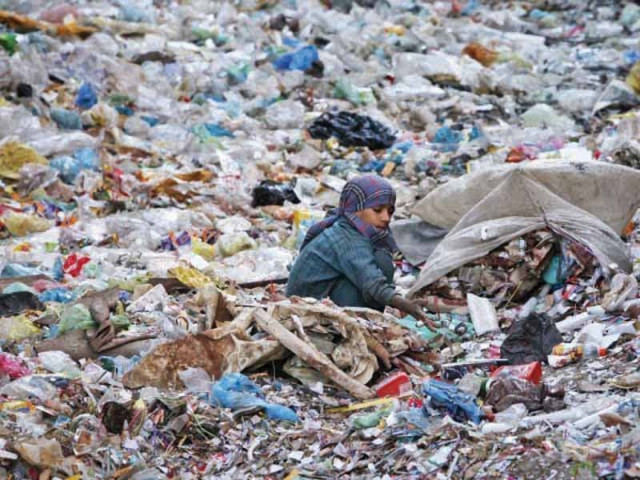Plastic waste chokes twin cities
Shopping bags, disposables clog drains, spread disease & undermine climate resilience

In the twin cities of Rawalpindi and Islamabad, plastic products such as shopping bags, disposable cutlery and food containers have emerged as a serious threat, not only to public health but also to climate resilience and environmental sustainability.
As elsewhere in the country, the twin cities are struggling with the destructive impact of plastic. A shopping bag costing just Rs2 can cripple sewage and drainage systems worth billions. Clogged drains and sewers cause filthy water to overflow into streets and alleyways, spreading disease. Addressing plastic pollution has become increasingly difficult alongside other urban challenges.
In Rawalpindi's densely populated Liaquat Bagh, a large section of the park has been turned into a dumping ground. Nearby stand the Rawalpindi Press Club, Rawalpindi Development Authority (RDA), Parks and Horticulture Authority (PHA) and other government offices, all of which have failed to relocate this vast waste site outside the city. Similarly, a dumping ground has sprung up near Islamabad's main fruit and vegetable market, further degrading the environment.
Experts in health and the environment warn that despite advances in climate policy, the unchecked spread of plastic poses a grave threat to climate stability. They caution that unless urgent measures are taken, Rawalpindi and Islamabad risk becoming two of Pakistan's most polluted cities by 2030.
They urge investment in recycling and scientific innovation to convert plastic waste into useful resources. Speaking to The Express Tribune, experts stressed that unchecked pollution will also inflict severe damage on the national economy as climate change gathers pace.
Health impacts of plastic
Dr Naveed highlighted the harmful effects of plastic pollution, noting its role in endangering marine life, obstructing sewage systems and spreading disease. Despite widespread awareness, he said, plastic remains ubiquitous - from household items to food packaging.
Dermatologist Shahid Baloch added that heating plastic releases toxic chemicals that can cause respiratory diseases and cancer.
At a time when climate change impacts are accelerating, more than 300 million tonnes of plastic are produced globally each year - half of it single-use. Experts stress that this surge must be curbed. Countries such as Sri Lanka, Bangladesh, the United Kingdom and South Africa have already taken decisive measures, while Pakistan stands at a critical crossroads, facing one of the region's most acute environmental challenges.
Weak enforcement of restrictions
Despite the lack of a comprehensive federal or provincial policy, an SRO banning plastic bags has been issued in major cities including Islamabad, Rawalpindi, Lahore and Hunza. Yet enforcement has been poor. Previous attempts, through awareness campaigns and fines, have failed to reduce usage, and plastic continues to be widely used for food storage and waste disposal.
Environmental and health specialists have voiced deep concern over the consequences of plastic proliferation. Nazifa Butt, Director of Climate Action and Sustainability at WWF Pakistan, said: "The Chief Minister's Clean Punjab slogan is welcome, but we also need a Clean Pakistan initiative at the federal level. Policies must be framed to reduce plastic production, improve collection, segregation and recycling, and move towards a regional circular economy framework for plastics."
She noted that nearly half of Pakistan's waste goes uncollected, ending up in informal dumps. The country currently produces 3.9 million tonnes of plastic waste annually - a figure expected to rise to 6.12m tonnes by 2050. Of this, about 70% (2.6m tonnes) is mismanaged, improperly dumped or leaked into rivers and seas.





















COMMENTS
Comments are moderated and generally will be posted if they are on-topic and not abusive.
For more information, please see our Comments FAQ